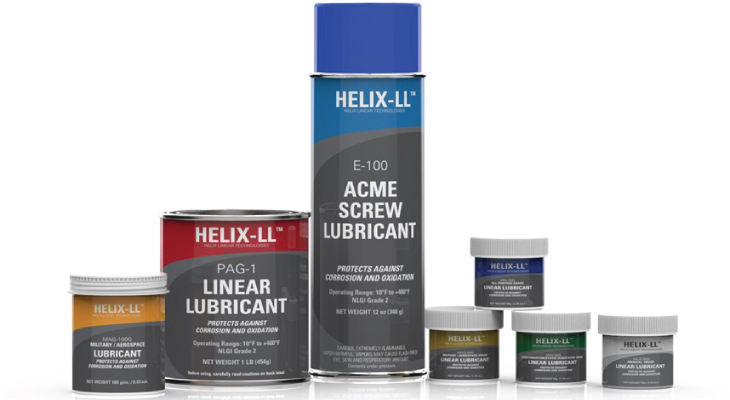How to Choose a Lubricant for Acme Screws

Ensuring optimal performance of acme screws and other types of lead screw assemblies often requires pairing the right screw and nut materials with the most suitable lubricant for a particular job. Acme screws are increasingly becoming the preferred solution for linear actuation and motion control in a wide variety of machine designs because of their performance and cost-saving advantages. Choosing a suitable lubricant is critically essential to a successful application. Lubricants for linear motion applications can be purchased in our online store.
By their very nature, acme screws involve friction. Lead screws utilize the helix angle of the screw thread—29 degrees on acme - to convert rotary motion into linear motion and rely on the coefficient of friction between the nut and screw to position loads. Screws are available in various materials, such as carbon steel, stainless steel, and a range of specially engineered plastics, and can be paired with an internally lubricated plastic or a bearing-grade bronze nut. The primary purpose of lead screw lubrication is to reduce friction, limit wear, and extend service life.
However, before you can choose the suitable screw lubricant for your application, you’ll need to familiarize yourself with the other functions of lubrication, the types of lubricants that are available, and the reasons why a particular lubricant may fail. Understanding available lubricants and potential failure scenarios can help you narrow down the right oil, grease, or other types of lubricant for your situation, enabling you to avoid machine downtime and repairs.
Types of Acme and Lead Screw Lubricants
While friction reduction is a crucial function of lubrication, it also serves other purposes:
- Separation of nut and screw – Under the principle of hydrodynamic lubrication, a thin layer of lubricant can create a fluid film barrier between the moving parts.
- Transfer heat – Lubricants can dissipate heat away from the screw.
- Carry away debris, particles, and contaminants – Lubricants can carry debris, particles, or contaminants to filters or magnets for removal.
- Transmit power – Lubricants can enhance lead screw performance.
- Protect against wear and corrosion – While friction reduction in itself reduces wear, special anti-wear, anti-corrosion, or extreme-pressure lubricant additives can provide additional performance benefits.
Lubricant types fall within two general categories: liquid and non-liquid lubricants:
Liquid Lubricants – Petroleum-based mineral oils typically consist of 90 percent or higher base oil and 10 percent or fewer additives, which add or enhance unique properties or deter unwanted effects. For example, PTFE is a helpful additive because it doesn’t react chemically and operates at high temperatures of 662 °F.
Non-Liquid Lubricants – So-called dry lubricants are used in applications for which an oil-based lubricant is ineffective or unmanageable, such as the use of graphite powders at high temperatures or greases when machines or mechanisms are designed to be lubricated infrequently, if at all. These lubricants include:
- Grease
- Powders
- Air cushions
- Other specialized products
Self-Lubricating Materials – In recent years, specially engineered materials can imbue lubrication viscosity characteristics within the screw and nut.
Why Lubricants Fail
Lead screw assembly failure related to improper or inadequate lubrication can occur for many reasons. When a motion control system is about to fail, it will exhibit the following symptoms: excessive vibration or noise, pitting, or abrasive wear. The most likely reasons for lubrication failure are:
- Temperature -
- Overloading
- Over greasing
- High viscosity
- Poor lubricant circulation
- Unsuitable ambient temperature
- Damaging thermal conditions
- Moisture -
- Ambient conditions (e.g., humidity, rain, etc.)
- Improper washdown
- Hot operation, then quick shutoff
- Defective seals
- Additive depletion
- Improper venting
- Cooling system leakage
- Contamination (foreign matter in the lubricant) -
- Environmental/ambient conditions
- Contaminated lubricant
- Component wear particles
- Shoddy lubrication practices
- Poor/dirty lubrication storage
- Lubrication errors
- Combustion
- Coil leakage
- Viscosity -
- Oxidation
- Contamination
- Moisture
- Chemicals
- Misuse of Additives
- temperature
- Shoddy lubrication practices
Specifying a Screw Lubricant
To specify the proper screw lubricant, you need to fully understand the purpose of lubrication and the suitable types of lubricants for your machine design application. Specific applications require more or less lubrication, external or internal lubrication, and maintenance. When lubricants are correctly applied, they can provide unique performance benefits.
Good, consistent lubrication of any lead screw can provide long-term benefits. Even self-lubricating nuts can benefit from applying light Grease, reducing heat generation. When maximum performance is required in the most demanding applications, using the most suitable lubricant and the proper amount of lubricant can help you achieve maximum productivity.
Choosing the Right Lead Screw Lubricant for Your Application
Getting the most out of your acme screw motion control system requires adequate and proper lubrication. Whether your application needs standard oil-based lubricants, special additives, dry lubrication, or self-lubricating materials, familiarizing yourself with the lubrication options available—to reduce friction and wear, prevent Contamination and corrosion, or operate at high temperatures or pressures—will enable you to pair the best lubricant with the right acme screw, which can mean the difference between a smooth-functioning machine and failure.


